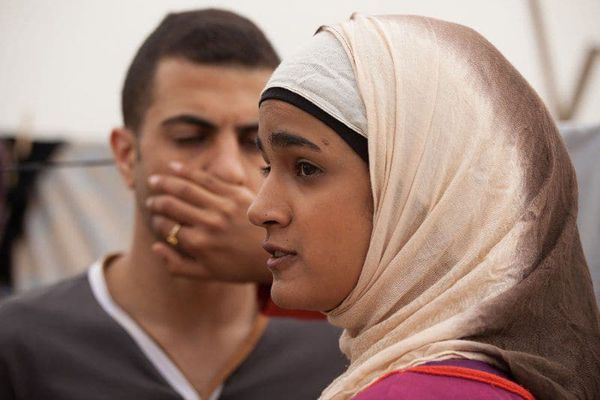Eye For Film >> Movies >> Sand Storm (2016) Film Review
Sand Storm
Reviewed by: Amber Wilkinson

With many feature debuts you get a sense of a writer/director learning on the job – moments when the shot choice, acting and script come together and others that feel as though they are not quite ready for action. Filmmaker Elite Zexer shows none of these hesitations in Sand Storm, quickly immersing us in her Bedouin village setting and deftly manipulating our emotions so that our sympathies are torn and turned on a dime. Building on her award-winning short Tasnim – whose character here is minor but, in keeping with the film's complexity, hints at more than one possible future - Zexer's first feature deservedly took home the World Cinema Dramatic prize at Sundance earlier this year.
Her story focuses on Layla (Palestinian actress Lamis Ammar), who lives with her family in a village that is integrated into the modern world – complete with Layla's trips to college where she noticeably mingles with students in more Western dress – but paradoxically cut off from it by a lack of general amenities and firm traditions that hold the community in their grip. From the start, it seems that Layla is a bit of a daddy's girl, wrapping her father (Hitham Omari) round her finger while being much less close to her mum (Ruba Blal-Asfour). Perhaps it's a reflection of how her father feels, as he is just about to marry his (younger) second wife with the first having to make the preparations and get used to the idea of her living next door. When Layla's mum discovers her daughter has fallen for a boy outside of their community, tensions rise and the teenager suddenly finds her mother may be an unexpected ally after all.

While, on paper, this may like a simple case of a patriarchy controlling women in the face of matriarchal solidarity, Zexer's film is smart enough to recognise that relationships and life are much more complicated than that and that choice and change don't come cheaply. The bad guy here is not a person but an unwavering cultural adherence, with Layla's father shown to be as trapped by tradition as the women in his life – "Do you ever do anything because you want to?" he is asked. It would also have been easy to simply paint the second wife as a blousy interloper, but her no-spring-chicken age and status as a 'second' wife hint that she is as much of a pawn in this societal game as the others.
Worlds don't so much collide as scorch one another with the friction of close contact and although not overtly political, Zexer doesn't shy away from wider world implications concerning the vital infrastructure that has passed these communities by and Israel's bulldozing of homes. She does this not by having her characters talk about these situations but by showing the impact of isolation or a broken generator. The shifting sands she creates ensure we feel as uncertain as her characters about who is in the right and who in the wrong until finally understanding that this is a deeper tussle between human independence and the expectations of a tradition resilient to change.
Reviewed on: 05 Apr 2016














